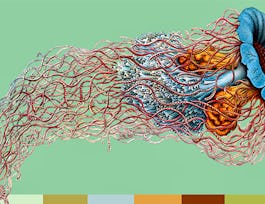Before the advent of quantum mechanics in the early 20th century, most scientists believed that it should be possible to predict the behavior of any object in the universe simply by understanding the behavior of its constituent parts. For instance, if one could write down the equations of motion for every atom in a system, it should be possible to solve those equations (with the aid of a sufficiently large computing device) and make accurate predictions about that system’s future.



Emergent Phenomena in Science and Everyday Life



Instructors: Michael Dennin
Sponsored by IEM UEM Group
14,547 already enrolled
(150 reviews)
Skills you'll gain
Details to know

Add to your LinkedIn profile
5 assignments
See how employees at top companies are mastering in-demand skills


Earn a career certificate
Add this credential to your LinkedIn profile, resume, or CV
Share it on social media and in your performance review

There are 6 modules in this course
In this module we'll introduce the concept of emergence and provide an orientation to how this course will proceed.
What's included
3 videos3 readings
Can a substance be both a solid and a liquid? In this module we’ll take a close look at our first emergent phenomena, complex fluids.
What's included
4 videos2 readings1 assignment1 peer review
Are seemingly random events truly random? In this module, we'll examine ways that deterministic processes can produce the appearance of randomness.
What's included
7 videos2 readings1 assignment1 peer review
Have you ever wondered why tigers have spots and leopards have spots? This module helps to explain how these and other patterns form in nature.
What's included
8 videos2 readings1 assignment1 peer review
How can we study quantum events from both a reductionist and emergent perspective? This module takes a look at the atomic and quantum level of some everyday phenomena.
What's included
6 videos2 readings1 assignment
One of the most awe inspiring emergent phenomena is how consciousness emerges from complex collections of atoms and molecules. In this module, we’ll take a look at how the various regions of our brain coordinate and interact to produce consciousness.
What's included
3 videos2 readings1 assignment1 peer review
Instructors



Offered by
Why people choose Coursera for their career




Learner reviews
150 reviews
- 5 stars
63.33%
- 4 stars
19.33%
- 3 stars
9.33%
- 2 stars
5.33%
- 1 star
2.66%
Showing 3 of 150
Reviewed on May 7, 2017
i enjoyed all the different modules. I recommend they add more explanation to the chaos game assignment.
Reviewed on May 21, 2019
Good sampler course for those curious about emergent patterns across a variety of fields. Casual and fun, although the focus on peer graded assessments somewhat detract from it.
Reviewed on Feb 5, 2019
A very good course in introducing advanced concepts in a simple way and have performed the spirit of multidisciplinary research very well.
Recommended if you're interested in Physical Science and Engineering

University of Colorado Boulder

University of Illinois Urbana-Champaign

University of Colorado Boulder

Rice University

Open new doors with Coursera Plus
Unlimited access to 10,000+ world-class courses, hands-on projects, and job-ready certificate programs - all included in your subscription
Advance your career with an online degree
Earn a degree from world-class universities - 100% online
Join over 3,400 global companies that choose Coursera for Business
Upskill your employees to excel in the digital economy





